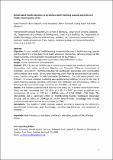Files in this item
School-based health education programmes, health-learning capacity and child oral health–related quality of life
Item metadata
| dc.contributor.author | Freeman, Ruth | |
| dc.contributor.author | Gibson, Barry | |
| dc.contributor.author | Humphris, Gerald Michael | |
| dc.contributor.author | Leonard, Helen | |
| dc.contributor.author | Yuan, Siyang | |
| dc.contributor.author | Whelton, Helen | |
| dc.date.accessioned | 2016-03-09T09:40:03Z | |
| dc.date.available | 2016-03-09T09:40:03Z | |
| dc.date.issued | 2016-10-01 | |
| dc.identifier | 240106021 | |
| dc.identifier | 8e513229-8945-430f-bf31-a427136b3df8 | |
| dc.identifier | 84987704267 | |
| dc.identifier | 000383212200006 | |
| dc.identifier.citation | Freeman , R , Gibson , B , Humphris , G M , Leonard , H , Yuan , S & Whelton , H 2016 , ' School-based health education programmes, health-learning capacity and child oral health–related quality of life ' , Health Education Journal , vol. 75 , no. 6 , pp. 698-711 . https://doi.org/10.1177/0017896915612856 | en |
| dc.identifier.issn | 0017-8969 | |
| dc.identifier.other | ORCID: /0000-0002-4601-8834/work/64033892 | |
| dc.identifier.uri | https://hdl.handle.net/10023/8384 | |
| dc.description | This research was funded by The Research and Development Office, Directorate of the Northern Ireland Health and Social Services Agency and the Department of Health and Children, Dublin, Ireland. It was also supported by the Dental Health Foundation, Ireland. | en |
| dc.description.abstract | Objective To use a model of health learning to examine the role of health-learning capacity and the effect of a school-based oral health education intervention (Winning Smiles) on the health outcome, child oral health–related quality of life (COHRQoL). Setting Primary schools, high social deprivation, Ireland/Northern Ireland. Design Cluster randomised controlled trial. Method A total of 383, 7- to 8-year-old children were invited to participate and randomly allocated into intervention and control conditions. Baseline and 12-month follow-up assessments of COHRQoL, self-esteem, toothbrushing–fluoride toothpaste knowledge and unstimulated saliva samples were made. An 18-hour post-brushing, saliva fluoride concentration was used to assess toothbrushing with fluoride toothpaste (behaviour). The data were entered onto SPSSv22. Structural equation modelling was applied using AMOSv22 to test for the role of health-learning capacity (baseline self-esteem and COHRQoL) and simultaneous effects of Winning Smiles upon knowledge, behaviour and COHRQoL (at follow-up). Results A total of 238 children participated at baseline and follow-up. A partial latent hybrid model fitted the data reasonably well (χ2 = 65.6, df = 50, p = .07) as shown in addition by a Comparative Fit Index of .97 and a Root Mean Square Error of Approximation (RMSEA) value of .042 (90% confidence interval [CI]: .00, .06). The intervention had a significant effect on toothbrushing–fluoride toothpaste knowledge (p < .03) and an effect on COHRQoL atthe 6% level (p < .06). Knowledge was strongly associated with saliva fluoride concentration (p < .002). Conclusion The model of health-learning capacity assisted in explaining the effect of a school-based intervention upon knowledge, toothbrushing behaviour and tentatively on COHRQoL. | |
| dc.format.extent | 14 | |
| dc.format.extent | 348291 | |
| dc.language.iso | eng | |
| dc.relation.ispartof | Health Education Journal | en |
| dc.subject | Health literacy | en |
| dc.subject | Quality of life | en |
| dc.subject | School-based oral health education | en |
| dc.subject | Winning Smiles | en |
| dc.subject | RA Public aspects of medicine | en |
| dc.subject | NDAS | en |
| dc.subject.lcc | RA | en |
| dc.title | School-based health education programmes, health-learning capacity and child oral health–related quality of life | en |
| dc.type | Journal article | en |
| dc.contributor.institution | University of St Andrews. School of Medicine | en |
| dc.contributor.institution | University of St Andrews. WHO Collaborating Centre for International Child & Adolescent Health Policy | en |
| dc.contributor.institution | University of St Andrews. St Andrews Sustainability Institute | en |
| dc.contributor.institution | University of St Andrews. Health Psychology | en |
| dc.identifier.doi | 10.1177/0017896915612856 | |
| dc.description.status | Peer reviewed | en |
This item appears in the following Collection(s)
Items in the St Andrews Research Repository are protected by copyright, with all rights reserved, unless otherwise indicated.

